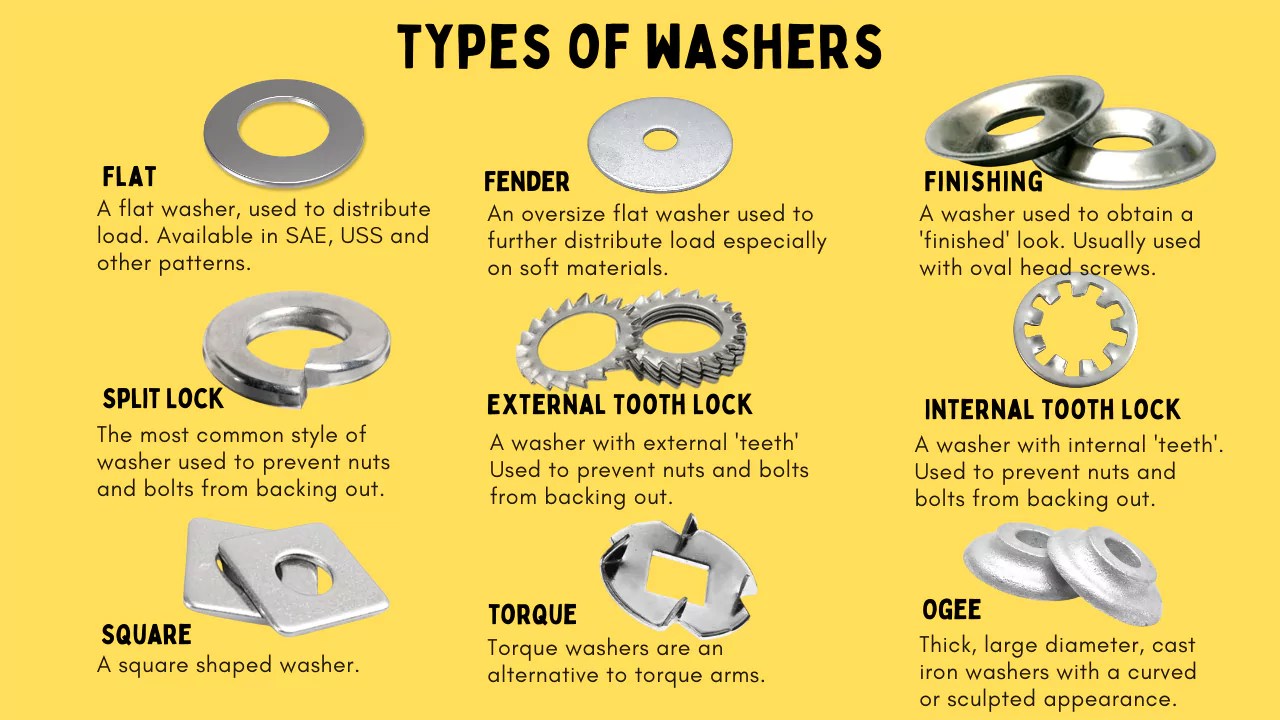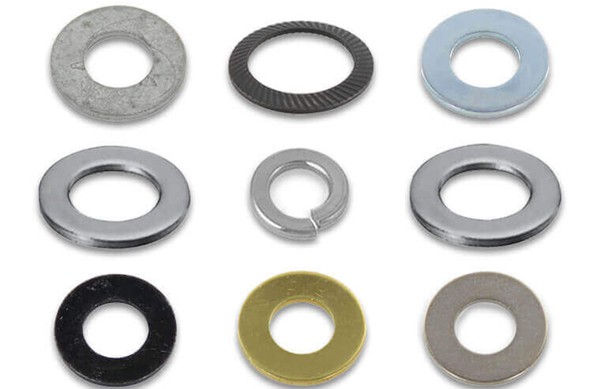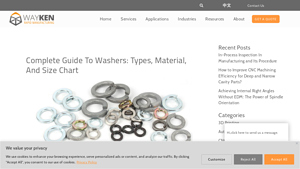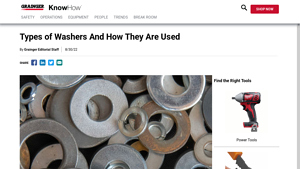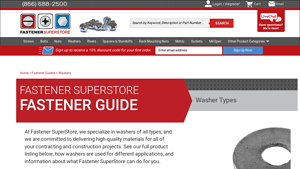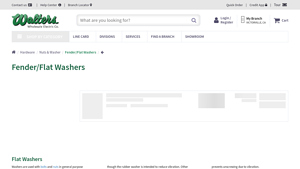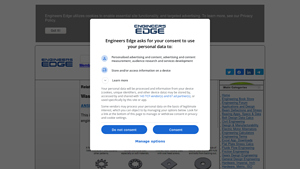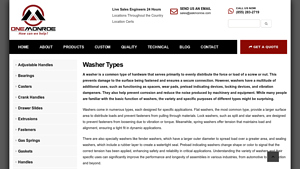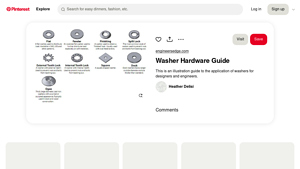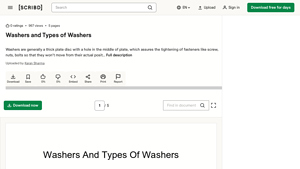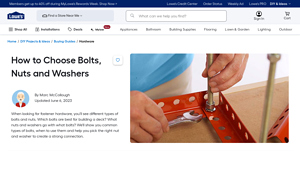Introduction: Navigating the Global Market for washer types hardware
In the rapidly evolving landscape of industrial hardware, sourcing the right washer types can pose significant challenges for international B2B buyers. Whether you are operating in the automotive, construction, or manufacturing sectors, understanding the nuances of various washers—such as their types, materials, and applications—is crucial. This comprehensive guide delves deep into the world of washer types hardware, equipping decision-makers from regions like Africa, South America, the Middle East, and Europe with the insights needed to make informed purchasing decisions.
Throughout this guide, we will explore different washer types, their specific applications, and the materials that best suit various environments. Furthermore, we will cover essential topics such as supplier vetting, pricing strategies, and industry standards, empowering buyers to navigate the complexities of the global market effectively. By demystifying the selection process and highlighting the importance of washers in ensuring structural integrity and performance, this resource aims to facilitate smarter procurement strategies. As you engage with this guide, you will find actionable insights tailored to your unique market needs, enabling you to optimize your sourcing processes and enhance operational efficiencies.
Understanding washer types hardware Types and Variations
| Type Name | Key Distinguishing Features | Primary B2B Applications | Brief Pros & Cons for Buyers |
|---|---|---|---|
| Plain Washer | Flat, circular disc with a central hole | General construction, automotive, machinery | Pros: Versatile, easy to source. Cons: Limited load distribution compared to specialized types. |
| Spring Washer | Curved design that provides axial flexibility | Machinery, automotive, heavy equipment | Pros: Prevents loosening due to vibrations. Cons: May require specific sizing for effectiveness. |
| Lock Washer | Features teeth or a split design to resist loosening | Aerospace, automotive, heavy machinery | Pros: Enhances fastening security. Cons: Can be harder to install correctly. |
| Fender Washer | Larger outer diameter with a small center hole | Automotive, plumbing, sheet metal work | Pros: Distributes load over a wider area. Cons: Less effective in high-stress applications. |
| Finishing Washer | Countersunk design for flush surface finish | Furniture assembly, cabinetry, construction | Pros: Aesthetic appeal with flush finish. Cons: Limited application for non-countersunk screws. |
What are the Characteristics of Plain Washers and Their Suitability?
Plain washers, commonly referred to as flat washers, are circular discs with a hole in the center. They are primarily used to distribute the load of a fastener over a larger area, preventing damage to the material being fastened. These washers are suitable for a wide range of applications, including general construction and automotive industries, due to their versatility and ease of sourcing. When purchasing, buyers should consider the size and thickness to ensure they meet the specific requirements of their projects.
How Do Spring Washers Enhance Fastening in Machinery?
Spring washers are uniquely designed with a curved shape that allows for axial flexibility, making them ideal for applications where vibration is a concern. This feature helps maintain tension and prevents fasteners from loosening over time, particularly in machinery and automotive applications. B2B buyers should evaluate the material and size of spring washers to ensure they can accommodate the specific vibrations and loads present in their operations.
What Advantages Do Lock Washers Provide in High-Stress Applications?
Lock washers are specifically engineered to prevent loosening of fasteners through their unique design, which often includes teeth or a split that grips the surface. These washers are crucial in high-stress applications such as aerospace and heavy machinery, where safety and reliability are paramount. Buyers should assess the compatibility of lock washers with their fasteners and consider installation methods, as improper installation can compromise their effectiveness.
Why Are Fender Washers Preferred in Automotive and Plumbing Industries?
Fender washers are characterized by their larger outer diameter and smaller center hole, allowing them to distribute the load over a wider area. This makes them particularly useful in automotive and plumbing applications, where they help prevent damage to thin materials. When selecting fender washers, buyers should consider the thickness of the materials they are working with to ensure optimal load distribution and performance.
What Makes Finishing Washers Ideal for Aesthetic Applications?
Finishing washers, also known as countersunk washers, feature a design that allows them to sit flush with the surface of the material when secured with countersunk screws. This provides a clean, aesthetically pleasing finish, making them ideal for applications in furniture assembly and cabinetry. Buyers should ensure that the finishing washers are compatible with the specific countersunk screws they plan to use, as this will affect both functionality and appearance.
Key Industrial Applications of washer types hardware
| Industry/Sector | Specific Application of washer types hardware | Value/Benefit for the Business | Key Sourcing Considerations for this Application |
|---|---|---|---|
| Automotive | Use of fender washers in vehicle assembly lines | Distributes load, preventing metal deformation and ensuring durability | Availability of corrosion-resistant materials; compliance with automotive standards |
| Construction | Application of plain washers in structural frameworks | Enhances load distribution, reducing the risk of structural failure | Sourcing from local suppliers to reduce lead times and ensure material quality |
| Oil & Gas | Use of sealing washers in pipeline connections | Prevents leakage, ensuring safety and operational efficiency | Need for high-temperature and high-pressure rated materials; certification compliance |
| Electronics | Use of shoulder washers in circuit boards | Provides electrical insulation and prevents short circuits | Consideration for size precision and material compatibility with electronic components |
| Renewable Energy | Application of spring washers in wind turbine assembly | Absorbs vibrations, maintaining mechanical integrity and performance | Sourcing durable materials that withstand environmental conditions; global supply chain reliability |
How Are Washer Types Hardware Utilized in the Automotive Sector?
In the automotive industry, fender washers play a crucial role in vehicle assembly. These washers are designed to distribute the load over a wider area, preventing deformation of thin metal sheets used in car bodies. This is particularly important in ensuring long-term durability and reliability of vehicles. International buyers must consider sourcing washers made from corrosion-resistant materials to withstand various environmental conditions and comply with stringent automotive standards.
What Role Do Washers Play in Construction Projects?
In construction, plain washers are essential for securing structural frameworks. They enhance load distribution, which minimizes the risk of structural failure under heavy loads. Buyers in this sector should prioritize sourcing from local suppliers to ensure timely delivery and adherence to local building codes. Additionally, selecting washers made from high-strength materials can further improve the integrity of construction projects.
How Are Washers Critical in the Oil & Gas Industry?
Sealing washers are vital in the oil and gas sector, particularly in pipeline connections where preventing leakage is paramount. These washers create a waterproof seal that ensures safety and operational efficiency, reducing the risk of environmental hazards. Buyers must focus on sourcing high-quality washers that are rated for high temperatures and pressures, and ensure compliance with industry-specific certifications to guarantee safety and reliability.
Why Are Shoulder Washers Important in Electronics Manufacturing?
In the electronics industry, shoulder washers provide electrical insulation and prevent short circuits in circuit boards. Their precise sizing and material compatibility are crucial for maintaining the integrity of electronic components. International buyers should consider the sourcing of shoulder washers that meet specific size requirements and are made from materials that can withstand heat and electrical stress, ensuring optimal performance of electronic devices.
How Do Spring Washers Enhance Performance in Renewable Energy Applications?
Spring washers are widely used in the assembly of wind turbines, where they play a key role in absorbing vibrations caused by wind and mechanical movement. This vibration absorption helps maintain the mechanical integrity and performance of the turbines. Buyers in the renewable energy sector should focus on sourcing durable spring washers that can withstand harsh environmental conditions, ensuring long-term operational reliability and efficiency.
3 Common User Pain Points for ‘washer types hardware’ & Their Solutions
Scenario 1: Misalignment and Vibration Issues in Assembly
The Problem:
In manufacturing settings, a common issue arises when assembling machinery with fasteners and washers. Misalignment of components can lead to excessive vibration during operation. This not only causes wear and tear on the machinery but can also lead to product failures, increasing downtime and repair costs. For B2B buyers in sectors like automotive or heavy machinery, ensuring that every component functions harmoniously is critical to maintaining operational efficiency.
The Solution:
To mitigate misalignment and vibration issues, it’s essential to use the right type of washer. Spring washers, particularly Belleville washers, are designed to absorb vibrations and maintain tension in fastened joints. When sourcing washers, buyers should evaluate the specific vibration characteristics of their machinery and select washers that provide adequate axial flexibility. It’s advisable to conduct a thorough analysis of the assembly process, focusing on areas prone to movement or vibration. Implementing vibration-dampening solutions can significantly reduce the risk of component failure and extend the lifespan of machinery. Additionally, consider collaborating with suppliers who can provide washers tailored to your specific needs, ensuring you receive products that meet your operational requirements.
Scenario 2: Corrosion Risk in Harsh Environments
The Problem:
B2B buyers operating in industries such as oil and gas, marine, or chemical processing often face the challenge of corrosion in their fastened assemblies. Traditional washers made from standard metals can degrade rapidly in harsh environments, leading to compromised structural integrity and safety hazards. This not only affects the longevity of the machinery but also increases maintenance costs and operational risks.
The Solution:
To combat corrosion, buyers should opt for washers made from corrosion-resistant materials such as stainless steel, brass, or specialized plastic compounds. When sourcing these washers, it’s crucial to assess the environmental conditions in which they will be used, including exposure to moisture, chemicals, or extreme temperatures. Consulting with suppliers who specialize in industrial hardware can provide insights into the best materials suited for specific applications. Additionally, implementing proper coating or sealant technologies can further enhance the corrosion resistance of washers. Regular maintenance and inspections of fastened joints are also vital to identify early signs of wear and replace components before they lead to larger failures.
Scenario 3: Sizing and Compatibility Confusion
The Problem:
A frequent pain point for B2B buyers is the confusion surrounding the correct sizing and compatibility of washers with various fasteners. Using the wrong size can lead to inadequate load distribution, increased wear, and even complete system failure. This issue is particularly pronounced in industries where precision and reliability are paramount, such as aerospace or construction.
The Solution:
To avoid sizing issues, it’s essential for buyers to have access to comprehensive size charts and specifications for washers. When placing orders, buyers should ensure they have the correct measurements of both the fasteners and the application surfaces. It is recommended to establish a standardized sizing protocol within the procurement process, ensuring that all team members are aligned on the specifications needed for each project. Additionally, working closely with suppliers who offer technical support can provide valuable insights into selecting the right washer type based on load requirements and application conditions. Regular training sessions for procurement and engineering teams on the nuances of washer types and their applications can also enhance overall efficiency and reduce costly mistakes.
Strategic Material Selection Guide for washer types hardware
What are the Key Properties of Common Washer Materials?
When selecting washers for various applications, the material plays a crucial role in determining performance, durability, and suitability for specific environments. Here, we analyze four common materials used in washer manufacturing: stainless steel, carbon steel, brass, and plastic.
How Does Stainless Steel Perform in Washer Applications?
Stainless steel is renowned for its excellent corrosion resistance, making it ideal for applications exposed to moisture or chemicals. Its ability to withstand high temperatures and pressures adds to its versatility. Stainless steel washers are commonly used in industries such as automotive, construction, and marine.
Pros: Stainless steel washers are durable and resistant to rust, which enhances their lifespan. They also maintain their structural integrity under extreme conditions.
Cons: The primary drawback is the higher cost compared to other materials. Manufacturing stainless steel washers can also be more complex due to the need for specialized equipment.
Impact on Application: Stainless steel washers are suitable for applications involving water, chemicals, and high temperatures. They are compliant with international standards such as ASTM and DIN, making them a preferred choice for global buyers.
What Advantages Does Carbon Steel Offer for Washers?
Carbon steel is a popular choice for washers due to its strength and affordability. It performs well in applications where high load-bearing capacity is required, such as in heavy machinery and construction.
Pros: Carbon steel washers are cost-effective and provide excellent mechanical properties, including tensile strength and hardness.
Cons: However, carbon steel is susceptible to rust and corrosion if not properly treated. This limits its use in environments with high moisture or chemical exposure.
Impact on Application: Carbon steel washers are often used in dry conditions or where protective coatings are applied. International buyers should ensure compliance with relevant standards to avoid issues in harsh environments.
How Does Brass Compare as a Washer Material?
Brass, an alloy of copper and zinc, offers good corrosion resistance and excellent conductivity, making it suitable for electrical applications. It is commonly used in plumbing and electrical fittings.
Pros: Brass washers are resistant to corrosion and have a pleasing aesthetic appeal. They are also relatively easy to machine, which simplifies manufacturing.
Cons: The main limitation of brass is its relatively lower strength compared to steel, making it less suitable for high-load applications. Additionally, brass can be more expensive than carbon steel.
Impact on Application: Brass washers are ideal for applications requiring electrical conductivity or aesthetic considerations. Compliance with standards such as JIS is essential for international buyers, especially in the electrical and plumbing sectors.
What Role Does Plastic Play in Washer Manufacturing?
Plastic washers, made from materials such as nylon or PTFE, are increasingly popular due to their lightweight and non-corrosive properties. They are often used in applications where electrical insulation is required.
Pros: Plastic washers are resistant to corrosion and chemicals, making them suitable for a wide range of environments. They are also lightweight and cost-effective.
Cons: However, plastic washers may not withstand high temperatures or heavy loads as effectively as metal washers. Their mechanical properties can be inferior in demanding applications.
Impact on Application: Plastic washers are commonly used in electronics, plumbing, and automotive applications where insulation and corrosion resistance are critical. International buyers should consider compliance with relevant standards to ensure product reliability.
Summary Table of Washer Materials
| Material | Typical Use Case for washer types hardware | Key Advantage | Key Disadvantage/Limitation | Relative Cost (Low/Med/High) |
|---|---|---|---|---|
| Stainless Steel | Marine, automotive, construction | Excellent corrosion resistance | Higher cost | High |
| Carbon Steel | Heavy machinery, construction | Cost-effective, strong | Susceptible to rust | Low |
| Brass | Plumbing, electrical fittings | Good corrosion resistance, aesthetic | Lower strength than steel | Med |
| Plastic | Electronics, plumbing | Lightweight, non-corrosive | Limited load-bearing capacity | Low |
This strategic material selection guide provides essential insights for international B2B buyers, enabling them to make informed decisions based on the specific requirements of their applications and compliance with global standards.
In-depth Look: Manufacturing Processes and Quality Assurance for washer types hardware
What Are the Main Stages in Manufacturing Washer Types Hardware?
The manufacturing of washer types hardware involves several critical stages that ensure each component meets the required specifications and quality standards.
Material Preparation: How Are Raw Materials Selected and Processed?
The first step in washer manufacturing is the selection and preparation of raw materials. Common materials include stainless steel, carbon steel, aluminum, brass, and various non-metallic substances like plastic and rubber. The selection process considers factors such as corrosion resistance, tensile strength, and the intended application of the washers.
After selecting the appropriate material, it undergoes processes such as cutting, shearing, or rolling to achieve the desired thickness and dimensions. This stage is crucial as it determines the mechanical properties and overall performance of the final product.
What Techniques Are Used for Forming Washers?
Forming is the next critical stage, where the prepared materials are shaped into washers. This can be done using various techniques:
- Stamping: This is the most common method, where a die is used to punch out washers from a sheet of metal. This technique is efficient for high-volume production and ensures consistency in size and shape.
- Machining: For more specialized or custom washers, machining may be employed. This involves using CNC machines to precisely cut and shape the washers from solid blocks of material.
- Injection Molding: For non-metallic washers, such as those made from rubber or plastic, injection molding is often used. This method allows for complex shapes and features while maintaining tight tolerances.
How Is Assembly and Finishing Done in Washer Manufacturing?
In some cases, washers may require assembly, especially if they are part of a more complex fastening system. For example, washers with integrated seals or those designed to work with specific fasteners may need additional components to be assembled together.
Finishing processes are equally important. These may include:
- Surface Treatment: Techniques such as plating, anodizing, or coating are applied to enhance corrosion resistance and improve aesthetic appeal.
- Deburring: This process removes any sharp edges or burrs that may have formed during manufacturing, ensuring safety and functionality.
What Are the Key Quality Assurance Measures for Washer Types Hardware?
Quality assurance (QA) is a fundamental aspect of the manufacturing process for washer types hardware. It ensures that the products meet international standards and satisfy customer requirements.
Which International Standards Should Buyers Be Aware Of?
Several international standards govern the quality of washers. Notably, ISO 9001 outlines the requirements for a quality management system, ensuring consistency and continuous improvement in manufacturing processes. Other relevant standards include:
- CE Marking: Indicates compliance with EU safety, health, and environmental protection standards.
- API Specification: Particularly important for washers used in the oil and gas industry, ensuring they meet specific performance and safety criteria.
These standards are crucial for international B2B buyers, as they ensure that the products can be safely and effectively used in their respective applications.
What Are the Key Quality Control Checkpoints in Manufacturing?
Quality control (QC) checkpoints play a vital role in maintaining product integrity throughout the manufacturing process. Key checkpoints include:
- Incoming Quality Control (IQC): This involves inspecting raw materials before they enter the production line to ensure they meet specifications.
- In-Process Quality Control (IPQC): Continuous monitoring during the manufacturing process helps identify any deviations from quality standards, allowing for immediate corrective actions.
- Final Quality Control (FQC): This stage involves a comprehensive inspection of finished products, including dimensional checks, surface quality assessments, and functional testing.
What Common Testing Methods Are Used to Ensure Washer Quality?
Common testing methods for quality assurance in washers include:
- Tensile Testing: Measures the strength of the material and its ability to withstand pulling forces.
- Hardness Testing: Determines the material’s resistance to deformation.
- Corrosion Resistance Testing: Assesses how well the washer can withstand corrosive environments, which is particularly important for applications exposed to moisture or chemicals.
These tests help ensure that washers not only meet the required specifications but are also suitable for their intended applications.
How Can B2B Buyers Verify Supplier Quality Control Practices?
For international B2B buyers, verifying the quality control practices of suppliers is essential to ensure that they receive reliable products. Here are some actionable strategies:
- Supplier Audits: Conducting on-site audits allows buyers to assess the manufacturing processes, quality control measures, and compliance with international standards.
- Requesting Quality Reports: Buyers should ask for detailed quality reports, including results from IQC, IPQC, and FQC. These documents provide insights into the supplier’s commitment to quality.
- Third-Party Inspections: Engaging third-party inspection services can provide an unbiased assessment of the manufacturer’s quality control practices and product quality.
What Are the Quality Control Nuances for International B2B Buyers?
International buyers, particularly from regions such as Africa, South America, the Middle East, and Europe, should be aware of specific nuances in quality control:
- Regulatory Compliance: Different regions may have unique regulatory requirements. Understanding these can help avoid compliance issues and potential penalties.
- Cultural Differences: Communication styles and business practices can vary significantly between regions. Establishing clear expectations and understanding local customs can facilitate smoother transactions.
- Logistical Considerations: Quality assurance extends beyond manufacturing. Factors such as shipping conditions, storage environments, and handling procedures can affect product quality. Buyers should ensure that suppliers have robust logistics strategies in place.
By understanding the manufacturing processes and quality assurance measures for washer types hardware, B2B buyers can make informed decisions and establish reliable partnerships with suppliers that meet their quality and performance expectations.
Practical Sourcing Guide: A Step-by-Step Checklist for ‘washer types hardware’
To successfully procure washer types hardware, it is essential to follow a structured approach that addresses both technical and supplier-related considerations. This guide provides a step-by-step checklist designed to streamline the sourcing process for B2B buyers, particularly in the diverse markets of Africa, South America, the Middle East, and Europe.
Step 1: Define Your Technical Specifications
Establishing clear technical specifications is the foundation of your sourcing process. Determine the exact type of washers required—whether plain, spring, or specialty washers—and the materials needed, such as stainless steel or plastic. This clarity will help prevent costly mistakes and ensure that the washers meet the intended application and performance criteria.
Step 2: Assess Quality Standards and Certifications
Verify that potential suppliers adhere to industry quality standards and possess relevant certifications. Look for certifications such as ISO 9001 or specific industry-related standards that guarantee product quality and consistency. This step is crucial to ensure that the washers you procure will perform reliably in your applications, especially in critical sectors like automotive or construction.
Step 3: Evaluate Potential Suppliers
Before committing to a supplier, conduct thorough evaluations. Request company profiles, product catalogs, and case studies to assess their capabilities. Additionally, reach out for references from existing clients, particularly those in your industry or region, to gauge the supplier’s reliability and service quality. This diligence helps mitigate risks and fosters long-term partnerships.
Step 4: Request Samples for Testing
Always request samples of the washers you intend to purchase. Testing these samples in your application allows you to evaluate their performance, compatibility, and overall quality firsthand. This step is vital to avoid future issues related to fit, function, or durability, ensuring that the selected washers will meet your operational demands.
Step 5: Compare Pricing and Terms
Once you have identified potential suppliers, compare their pricing structures and payment terms. While cost is a critical factor, consider the total value offered, including shipping, lead times, and after-sales support. This comprehensive assessment will help you find a balance between cost-effectiveness and quality, ensuring optimal procurement.
Step 6: Negotiate Contracts Carefully
Engage in negotiations with selected suppliers to finalize contracts. Ensure that all terms are clearly defined, including delivery schedules, pricing, and warranty conditions. A well-negotiated contract protects your interests and establishes a clear understanding between both parties, minimizing the potential for disputes in the future.
Step 7: Plan for Logistics and Supply Chain Management
Finally, develop a logistics plan for the delivery of your washers. Consider the supplier’s location, shipping methods, and customs regulations that may apply, particularly for international transactions. Effective supply chain management is critical to ensure timely delivery and minimize disruptions, allowing your operations to run smoothly.
Following these steps will enable B2B buyers to navigate the complexities of sourcing washer types hardware effectively, ensuring that they procure the right products for their specific needs while fostering strong supplier relationships.
Comprehensive Cost and Pricing Analysis for washer types hardware Sourcing
What Are the Key Cost Components for Sourcing Washer Types Hardware?
When engaging in the procurement of washer types hardware, understanding the cost structure is essential for B2B buyers. The total cost can be broken down into several components:
-
Materials: The choice of material significantly impacts the overall cost. Common materials such as stainless steel, brass, and plastic vary in price based on market demand and availability. Specialty materials may incur higher costs due to their unique properties and limited supply.
-
Labor: Labor costs encompass the wages paid to workers involved in manufacturing washers. This can vary based on the location of the manufacturing facility, as labor rates differ from one region to another.
-
Manufacturing Overhead: This includes costs related to utilities, equipment maintenance, and facility expenses. Efficient manufacturing processes can lower overhead costs, which can be a negotiating point for buyers.
-
Tooling: Initial tooling costs can be substantial, especially for custom washers. Tooling refers to the equipment and molds required to produce specific washer types, and these costs can be amortized over large production runs to reduce per-unit expenses.
-
Quality Control (QC): Implementing rigorous QC measures is vital for ensuring the reliability of washer types hardware. The cost associated with QC can vary based on the complexity of the washers and the standards required, such as ISO certifications.
-
Logistics: Shipping and handling costs can fluctuate based on the distance from the supplier to the buyer, as well as the shipping method chosen. Understanding the total logistics costs, including tariffs and customs duties, is crucial for accurate pricing.
-
Margin: Suppliers will typically add a margin to cover their costs and ensure profitability. This margin can be influenced by market competition and demand.
How Do Price Influencers Affect the Cost of Washer Types Hardware?
Several factors influence the pricing of washer types hardware that B2B buyers should consider:
-
Volume/MOQ (Minimum Order Quantity): Purchasing in larger volumes often leads to reduced per-unit costs. Suppliers may offer discounts based on quantity, making it essential for buyers to assess their needs carefully.
-
Specifications and Customization: Custom washers tailored to specific applications can incur additional costs. Buyers should clearly define their specifications to avoid unexpected expenses.
-
Materials: The choice of materials not only affects the initial cost but also the longevity and performance of the washers. Investing in higher-quality materials may yield better long-term value.
-
Quality and Certifications: Washers that meet specific industry standards or certifications (e.g., ISO, ASTM) may come with a higher price tag but can provide assurance of reliability and safety.
-
Supplier Factors: The supplier’s reputation, reliability, and production capacity can impact pricing. Established suppliers may charge more due to their proven track record, while new entrants might offer lower prices to gain market share.
-
Incoterms: Understanding the Incoterms (International Commercial Terms) is vital for international transactions. These terms dictate the responsibilities of buyers and sellers regarding shipping, insurance, and tariffs, which can affect overall costs.
What Are the Best Tips for B2B Buyers to Optimize Costs?
To maximize cost-efficiency in sourcing washer types hardware, B2B buyers should consider the following strategies:
-
Negotiation: Engage suppliers in discussions about pricing, especially if placing bulk orders. Don’t hesitate to negotiate terms and seek volume discounts.
-
Total Cost of Ownership (TCO): Assess the TCO rather than just the purchase price. Consider factors such as durability, maintenance, and potential failure costs over the product’s life cycle.
-
Understand Pricing Nuances: Be aware of regional pricing variations, especially when sourcing from different continents. For example, suppliers in Africa and South America may have different pricing structures due to local manufacturing capabilities and material availability.
-
Supplier Relationships: Building strong relationships with suppliers can lead to better pricing and priority service. Long-term partnerships often result in favorable terms.
-
Market Research: Conduct thorough market research to understand prevailing prices and trends. This knowledge can empower buyers during negotiations and help identify the best suppliers.
Disclaimer on Indicative Prices
Prices for washer types hardware can fluctuate based on market conditions, material costs, and supplier pricing strategies. It is advisable for buyers to request detailed quotes from multiple suppliers to ensure they receive competitive pricing tailored to their specific needs.
Alternatives Analysis: Comparing washer types hardware With Other Solutions
Exploring Alternative Solutions to Washer Types Hardware
In various industrial and construction applications, achieving optimal fastening and load distribution is crucial. While washer types hardware offers a range of solutions, alternative methods can also effectively meet specific needs. This analysis compares washer types hardware with two viable alternatives: adhesive bonding and threaded fasteners with integrated features.
Comparison Table
| Comparison Aspect | Washer Types Hardware | Adhesive Bonding | Threaded Fasteners with Integrated Features |
|---|---|---|---|
| Performance | Excellent load distribution and vibration absorption. | Effective for bonding dissimilar materials but limited in load-bearing capacity. | Enhanced holding power and reduced loosening; integrated solutions often include locking mechanisms. |
| Cost | Generally low-cost, especially in bulk. | Can be higher due to material costs and application method. | Varies widely; often more expensive than standard fasteners. |
| Ease of Implementation | Simple to install; requires minimal tools. | Requires surface preparation and curing time; more complex. | Easy to install; however, specialized tools may be needed for some integrated features. |
| Maintenance | Low maintenance; replacements are straightforward. | Can require periodic checks and potential reapplication. | Generally low maintenance, but integrated features may need inspection. |
| Best Use Case | Ideal for mechanical assemblies, automotive applications, and construction. | Best for non-structural applications or where aesthetics are important. | Suitable for high-stress applications where vibration is a concern and additional security is needed. |
In-Depth Analysis of Alternatives
What are the Advantages and Disadvantages of Adhesive Bonding?
Adhesive bonding involves using chemical compounds to join materials together. This method excels in applications where traditional fastening methods may not be suitable, such as bonding dissimilar materials like metal to plastic. One significant advantage of adhesive bonding is its ability to provide a smooth, flush finish, enhancing aesthetic appeal. However, the downside includes longer curing times and limitations in load-bearing capacity, making it less suitable for high-stress environments.
How do Threaded Fasteners with Integrated Features Compare?
Threaded fasteners with integrated features, such as built-in locking mechanisms or washers, offer a robust alternative to standard washers. These fasteners can significantly reduce the risk of loosening due to vibration and provide superior holding power. However, they can be more expensive than traditional washers and may require specialized tools for installation. This solution is particularly effective in high-stress applications like automotive and aerospace industries where reliability is paramount.
Conclusion: How to Choose the Right Solution for Your Needs
Selecting the right fastening solution requires a comprehensive understanding of your specific application requirements. For applications that demand consistent load distribution and vibration dampening, washer types hardware remains a dependable choice. However, if aesthetics or the bonding of dissimilar materials are critical, adhesive bonding may be more suitable. In high-stress environments, consider threaded fasteners with integrated features for enhanced security. By assessing performance, cost, ease of implementation, maintenance needs, and best use cases, B2B buyers can make informed decisions tailored to their operational needs.
Essential Technical Properties and Trade Terminology for washer types hardware
What Are the Key Technical Properties of Washer Types Hardware That B2B Buyers Should Know?
When selecting washers for specific applications, understanding the essential technical properties is crucial for ensuring optimal performance and longevity. Here are some critical specifications to consider:
1. Material Grade
The material grade of a washer significantly influences its strength, corrosion resistance, and suitability for various environments. Common materials include stainless steel, which offers excellent resistance to rust and corrosion; carbon steel, known for its high strength but lower corrosion resistance; and non-metallic options like rubber and plastic, which are ideal for specific applications requiring flexibility or insulation. Selecting the right material grade is essential for B2B buyers to ensure that the washers can withstand the operational conditions of their projects.
2. Tolerance
Tolerance refers to the allowable deviation from specified dimensions. In washer manufacturing, tight tolerances are essential to ensure that washers fit properly with fasteners and provide adequate load distribution. A washer with improper tolerance can lead to mechanical failure or reduced performance. B2B buyers should prioritize suppliers who can guarantee the necessary tolerances for their specific applications, as this can directly impact the reliability of the assembled products.
3. Thickness
The thickness of a washer plays a vital role in load distribution and the ability to absorb shock or vibration. Thicker washers can better distribute weight and reduce the risk of deformation under load, while thinner washers are often used in applications where space is limited. Understanding the required thickness is crucial for ensuring that the washer meets the mechanical demands of the application without compromising the integrity of the fastening system.
4. Finish
The finish of a washer affects its performance in various environments, particularly regarding corrosion resistance and friction. Common finishes include plain (raw), zinc-plated, and black oxide, each offering different levels of protection and aesthetic appeal. B2B buyers should consider the environmental conditions their washers will face and choose a finish that enhances durability and performance.
5. Load Rating
Load rating refers to the maximum load a washer can handle without failure. This specification is crucial for applications involving heavy machinery or structural components. Washers with higher load ratings are typically made from stronger materials and designed to distribute force more effectively. B2B buyers must match the load rating of washers to the demands of their applications to prevent premature failure.
What Common Trade Terms Should B2B Buyers Understand When Purchasing Washers?
In addition to technical properties, familiarity with industry terminology is essential for effective communication and negotiation in the B2B space. Here are several key terms:
1. OEM (Original Equipment Manufacturer)
An OEM is a company that produces components that are used in another company’s end products. In the context of washers, understanding whether a supplier operates as an OEM can help buyers assess product quality and compatibility with their specific applications.
2. MOQ (Minimum Order Quantity)
MOQ refers to the smallest quantity of a product that a supplier is willing to sell. This term is crucial for B2B buyers, especially those managing inventory and cash flow, as it directly impacts purchasing decisions and budget management.
3. RFQ (Request for Quotation)
An RFQ is a document sent by a buyer to suppliers requesting a price quote for specific products. In the washer industry, submitting an RFQ helps buyers obtain competitive pricing and terms, enabling informed decision-making.
4. Incoterms
Incoterms are international commercial terms that define the responsibilities of buyers and sellers in shipping agreements. Understanding these terms is vital for B2B buyers to clarify shipping costs, risks, and delivery timelines associated with washer purchases.
5. Certification Standards
Certification standards, such as ISO or ASTM, indicate compliance with specific quality and safety regulations. B2B buyers should look for washers that meet relevant certification standards to ensure product reliability and adherence to industry norms.
By comprehensively understanding these technical properties and trade terms, B2B buyers can make informed decisions that enhance the performance and reliability of their fastening systems.
Navigating Market Dynamics and Sourcing Trends in the washer types hardware Sector
What Are the Key Market Dynamics Influencing the Washer Types Hardware Sector?
The global washer types hardware market is experiencing significant growth, driven by increasing demand across various industries, including construction, automotive, and machinery. As international B2B buyers from regions such as Africa, South America, the Middle East, and Europe seek reliable hardware components, it is essential to understand the current market dynamics. One of the key trends is the rise of e-commerce platforms that facilitate easier access to suppliers and manufacturers. This trend is particularly beneficial for buyers in emerging markets, allowing them to source high-quality washers without geographical constraints.
Moreover, technological advancements in manufacturing processes, such as 3D printing and automation, are reshaping the production landscape. These innovations enable manufacturers to produce custom washer designs tailored to specific applications, enhancing product performance and reducing lead times. Additionally, the growing emphasis on safety and compliance standards, such as ISO certifications, is influencing buyers’ purchasing decisions. They are increasingly prioritizing suppliers who adhere to international quality standards, ensuring reliability and durability in their hardware components.
Lastly, fluctuating raw material prices, particularly for metals like stainless steel and brass, pose challenges for buyers. Understanding these fluctuations is crucial for effective cost management. Buyers should remain vigilant about market conditions and consider establishing long-term relationships with suppliers to mitigate risks associated with price volatility.
How Is Sustainability Influencing Sourcing Trends in the Washer Types Hardware Sector?
Sustainability has emerged as a critical factor in the sourcing strategies of B2B buyers in the washer types hardware sector. The environmental impact of manufacturing processes, including emissions and waste generation, is prompting companies to seek suppliers who prioritize sustainable practices. This shift is particularly relevant for buyers in regions like Europe, where regulatory frameworks are increasingly stringent regarding environmental compliance.
Ethical sourcing is also gaining traction, with buyers emphasizing the importance of transparency in supply chains. They are more inclined to partner with manufacturers who demonstrate responsible sourcing of materials, such as recycled metals and eco-friendly alternatives. Certifications such as ISO 14001 (Environmental Management) and other ‘green’ labels are becoming essential criteria in supplier selection processes.
Furthermore, the demand for environmentally friendly washer materials, such as biodegradable plastics or sustainably sourced metals, is on the rise. Buyers are actively looking for products that contribute to their sustainability goals, aligning with global trends towards corporate responsibility and eco-consciousness. Engaging with suppliers who prioritize sustainability not only enhances brand reputation but also opens opportunities for accessing new markets that favor environmentally friendly products.
What Are the Historical Developments That Have Shaped the Washer Types Hardware Market?
The washer types hardware sector has evolved significantly over the decades, influenced by technological advancements and changing industrial needs. Initially, washers were simple metal discs used primarily to distribute load and prevent damage to surfaces. As industries advanced, the need for specialized washers became apparent, leading to the development of various types, including lock washers, spring washers, and sealing washers, each tailored for specific applications.
The industrial revolution marked a turning point, as mass production techniques allowed for the widespread availability of washers in various materials, including stainless steel, brass, and plastics. This era also saw the introduction of international standards, ensuring consistency and quality across products. In recent years, the focus has shifted towards innovation, with manufacturers exploring new materials and production methods to meet the demands of modern industries.
Today, the washer types hardware market is characterized by a blend of tradition and innovation, where historical knowledge informs contemporary practices. Understanding this evolution is crucial for B2B buyers, as it provides insights into product development and the future trajectory of the industry.
Frequently Asked Questions (FAQs) for B2B Buyers of washer types hardware
-
How do I solve issues with washer compatibility in my projects?
To resolve compatibility issues with washers, start by identifying the specific requirements of your application, including the type of fastener, load-bearing capacity, and environmental conditions. Consult a washer size chart that details dimensions and thicknesses to ensure proper fit. Additionally, consider the material of the washer, as different materials offer varying levels of corrosion resistance and durability. If necessary, engage with suppliers who can provide technical specifications and advice on the best washer types for your specific needs. -
What is the best washer type for high-vibration applications?
For applications subjected to high vibrations, spring washers, particularly Belleville washers, are highly recommended. Their design allows for axial flexibility, which helps maintain tension and prevents loosening over time. Additionally, rubber or plastic washers can also absorb vibrations effectively while providing a cushioning effect. When selecting a washer, consider the specific vibration frequency and the materials involved to ensure optimal performance and longevity. -
How do I vet suppliers for washer types hardware?
To vet suppliers for washer types hardware, start by checking their industry reputation through reviews and testimonials from previous clients. Verify their certifications, such as ISO or other relevant standards, to ensure quality control practices. Request samples to assess product quality firsthand and inquire about their production capabilities, lead times, and compliance with international standards. Establish clear communication to gauge responsiveness and professionalism, which are crucial for long-term partnerships. -
What are the typical minimum order quantities (MOQs) for washers?
Minimum order quantities (MOQs) for washers can vary widely depending on the supplier and the specific type of washer. Commonly, MOQs can range from 100 to 1,000 pieces, but custom orders may have higher requirements. It’s advisable to discuss your needs directly with suppliers to negotiate MOQs that align with your purchasing strategy, especially if you’re looking for specialized or custom washers. Some suppliers may offer flexibility for first-time orders or bulk purchases. -
What payment terms should I expect when sourcing washers internationally?
Payment terms for international washer purchases typically include options like advance payment, letter of credit, or payment upon delivery. Standard practices often involve a 30% deposit upon order confirmation, with the remaining balance due before shipment. However, terms can vary based on the supplier’s policies and your negotiation. It’s essential to clarify payment terms upfront to avoid misunderstandings and ensure a smooth transaction process. -
What quality assurance measures should I look for in washer suppliers?
When sourcing washers, inquire about the supplier’s quality assurance (QA) processes, including material testing, dimensional checks, and adherence to international standards. Look for suppliers who provide certificates of compliance or inspection reports for their products. Additionally, consider suppliers that have established quality management systems, such as ISO 9001 certification, to ensure consistent product quality and reliability over time. -
How can I ensure timely logistics for my washer orders?
To ensure timely logistics for washer orders, collaborate closely with your supplier to establish clear timelines for production and shipping. Discuss shipping methods and choose reliable carriers with experience in international freight. It’s also helpful to stay informed about customs regulations in your destination country to avoid delays. Consider utilizing freight forwarders who can streamline the logistics process and provide tracking updates throughout the shipping journey. -
What factors should I consider when customizing washers for specific applications?
When customizing washers, consider factors such as material choice, dimensions, thickness, and specific performance requirements (e.g., corrosion resistance or load capacity). Engage with your supplier’s engineering team to discuss design specifications and ensure that the custom washer meets your application’s unique demands. Additionally, assess the potential impact on cost and lead times, as customization may require more extensive production processes and testing.
Important Disclaimer & Terms of Use
⚠️ Important Disclaimer
The information provided in this guide, including content regarding manufacturers, technical specifications, and market analysis, is for informational and educational purposes only. It does not constitute professional procurement advice, financial advice, or legal advice.
While we have made every effort to ensure the accuracy and timeliness of the information, we are not responsible for any errors, omissions, or outdated information. Market conditions, company details, and technical standards are subject to change.
B2B buyers must conduct their own independent and thorough due diligence before making any purchasing decisions. This includes contacting suppliers directly, verifying certifications, requesting samples, and seeking professional consultation. The risk of relying on any information in this guide is borne solely by the reader.
Top 9 Washer Types Hardware Manufacturers & Suppliers List
1. Wayken – Washers
Domain: waykenrm.com
Registered: 2013 (12 years)
Introduction: Washers are small, round, flat discs with a hole in the middle, made from various materials including brass, stainless steel, carbon steel, and non-metallic materials like ceramic and plastic. They serve multiple purposes:
1. Spacing and Alignment – Prevents fasteners from protruding and compensates for variations in spacing.
2. Load Distribution – Spreads load across a broader surface to reduce…
2. Grainger – Lock Washers
Domain: grainger.com
Registered: 1994 (31 years)
Introduction: This company, Grainger – Lock Washers, is a notable entity in the market. For specific product details, it is recommended to visit their website directly.
3. Fastener SuperStore – Washers
Domain: fastenersuperstore.com
Registered: 2004 (21 years)
Introduction: Fastener SuperStore specializes in various types of washers for contracting and construction projects. Key washer types include: 1. Flat Washers: Available in materials such as Steel (Zinc, Black Oxide, Hot Dip Galvanized), 18-8 Stainless Steel, and Aluminum. 2. Fender Washers: Larger outer diameter options, made from Steel (Zinc, Black Oxide, Hot Dip Galvanized) and 18-8 Stainless Steel. 3. Lock …
4. Walters Wholesale – Washers and Delivery Deals
Domain: walterswholesale.com
Registered: 1997 (28 years)
Introduction: This company, Walters Wholesale – Washers and Delivery Deals, is a notable entity in the market. For specific product details, it is recommended to visit their website directly.
5. Engineers Edge – Washer Application Guide
Domain: engineersedge.com
Registered: 2000 (25 years)
Introduction: This is an illustration guide to the application of washers for designers and engineers. It includes related guides such as the Specialty Screw Type Guide, Screw Type Guide, Bolts & Screw Type Guide, and Nut Fastener Type Guide.
6. Monroe Engineering – Washer Types
Domain: monroeengineering.com
Registered: 1999 (26 years)
Introduction: Washer Types: 1. Plain Washers: Most common type, designed to spread load and protect surfaces. Examples include fender washers, spherical washers, wall washers, and torque washers. 2. Spring Washers: Characterized by axial flexibility, ideal for machines with strong vibrations. Examples include belleville washers, curved disc washers, wave washers, split washers, tab washers, and toothed locked w…
7. Pinterest – Washer Types Guide
Domain: pinterest.com
Registered: 2009 (16 years)
Introduction: Washer Types | Nuts and washers, Washer, Screws and bolts. This is an illustration guide to the application of washers for designers and engineers.
8. Scribd – Washers
Domain: scribd.com
Registered: 2006 (19 years)
Introduction: Washers are thick plate discs with a hole in the middle, used to assure the tightening of fasteners like screws, nuts, and bolts, preventing them from moving from their actual position. They distribute the load of fasteners while acting as support agents. Washers can also function as spacers, locking devices, springs, and to reduce vibrations.
9. Lowe’s – Fastener Hardware
Domain: lowes.com
Registered: 1995 (30 years)
Introduction: Bolts, nuts, and washers are essential fastener hardware used to connect work pieces. Bolts have a head (typically hexagonal) and a cylindrical shaft with threads, while nuts have internal threads that fit onto the bolt. Washers are thin, unthreaded pieces that help distribute load and prevent loosening. Key types of bolts include:
1. **Hex Bolts**: Six-sided head, used for wood-to-wood or metal-…
Strategic Sourcing Conclusion and Outlook for washer types hardware
In conclusion, the strategic sourcing of washer types hardware is pivotal for optimizing performance and enhancing the longevity of various applications across industries. By understanding the diverse types of washers—such as plain, spring, and specialized variants—international B2B buyers can make informed decisions that align with their specific operational needs. The choice of materials, including stainless steel, brass, and non-metallic options, further influences durability and resistance to environmental factors, ensuring that the right washers are selected for the right applications.
As markets continue to evolve, the importance of strategic sourcing cannot be overstated. It not only drives cost efficiencies but also fosters stronger supplier relationships, enabling businesses to adapt to changing demands swiftly. For buyers in regions like Africa, South America, the Middle East, and Europe, leveraging local suppliers while considering global sourcing options can yield significant advantages in terms of quality and price.
Looking ahead, we encourage you to evaluate your current sourcing strategies for washers and explore innovative solutions that can enhance your supply chain resilience. Engage with suppliers who understand your market dynamics and can provide tailored solutions to meet your unique requirements. The future of washer types hardware is promising, and proactive sourcing will position your business for success.
